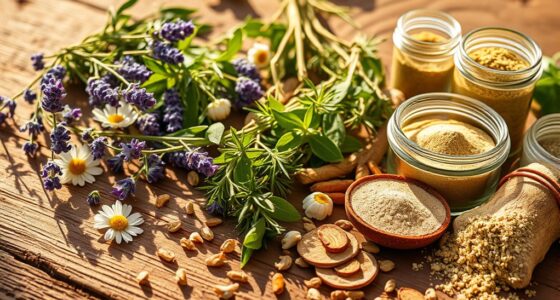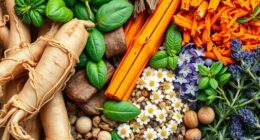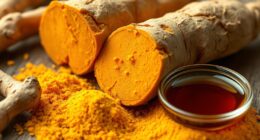Resveratrol, found in grape skins and red wine, shows promising anti-aging effects by acting as an antioxidant, activating longevity proteins, and improving cell function. While studies suggest it may support healthy aging and reduce cellular damage, challenges like low bioavailability and inconsistent results mean it’s not a proven miracle yet. To explore how this natural compound might fit into your wellness plan, keep going to discover more about its benefits and limitations.
Key Takeaways
- Resveratrol, found mainly in red wine, acts as a powerful antioxidant linked to cellular health and aging benefits.
- Scientific studies suggest resveratrol activates longevity pathways like SIRT1, promoting healthy aging and cellular repair.
- Evidence from lab and animal research indicates potential in improving lifespan and metabolic health; human benefits are promising but limited.
- Bioavailability challenges and inconsistent study results make definitive anti-aging claims difficult; supplement quality varies.
- Incorporating resveratrol into a balanced lifestyle may support healthy aging, but it is not a standalone miracle cure.
What Is Resveratrol and Where Does It Come From?
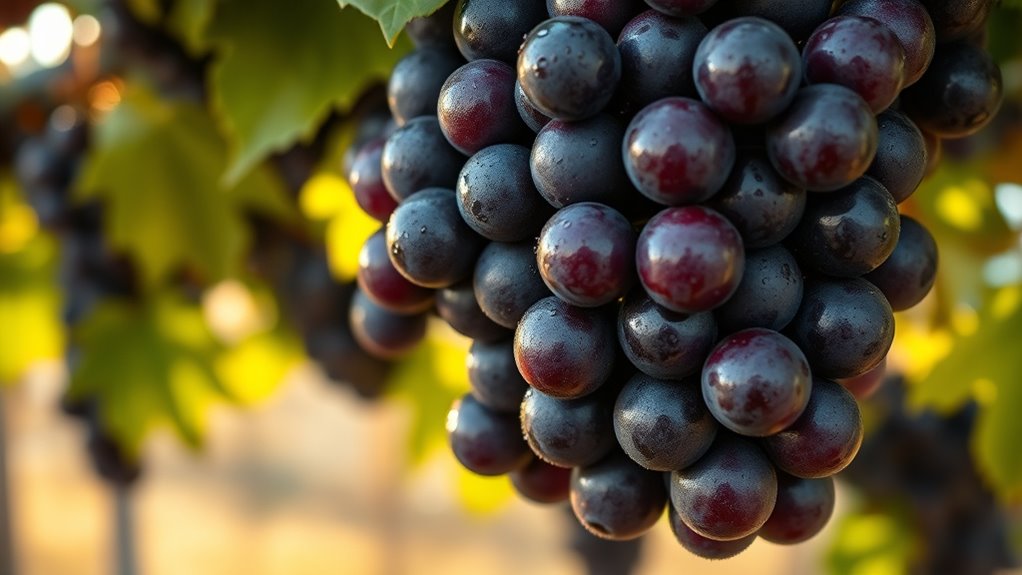
Resveratrol is a natural compound classified as a polyphenol, known for its antioxidant properties. You’ll find it in certain plants, where it helps protect against environmental stress like UV rays and pathogens. It’s most famously present in the skin of red grapes, which is why red wine contains it. Besides grapes, resveratrol also occurs in other foods such as blueberries, peanuts, and dark chocolate. Plants produce resveratrol as a defense mechanism, especially when their tissues are damaged or under attack. Humans have long consumed resveratrol through dietary sources, appreciating its potential health benefits. Its presence in these foods has sparked interest in its role as a natural supplement for promoting longevity and overall wellness.
How Resveratrol Interacts With the Body’s Aging Processes
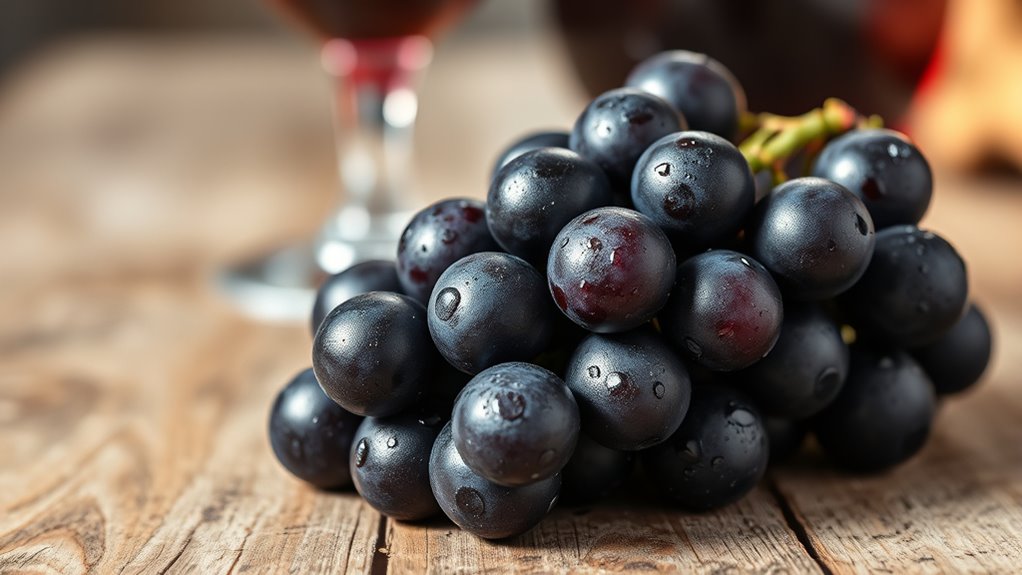
How exactly does resveratrol influence the aging process at the cellular level? It activates key proteins that regulate aging, like sirtuins, which promote cell repair and longevity. Resveratrol also reduces inflammation and neutralizes free radicals, preventing cellular damage. Additionally, it enhances mitochondrial function, boosting energy production and decreasing cell death. Finally, resveratrol influences gene expression related to aging, helping cells maintain their youthful state. To visualize this, imagine:
- Sirtuin activation repairing damaged DNA
- Lowered inflammation protecting tissues
- Improved mitochondrial efficiency increasing energy
- Gene regulation delaying cellular aging
Together, these mechanisms work to slow down aging at the microscopic level, supporting healthier, longer lives.
Scientific Evidence Supporting Resveratrol’s Benefits
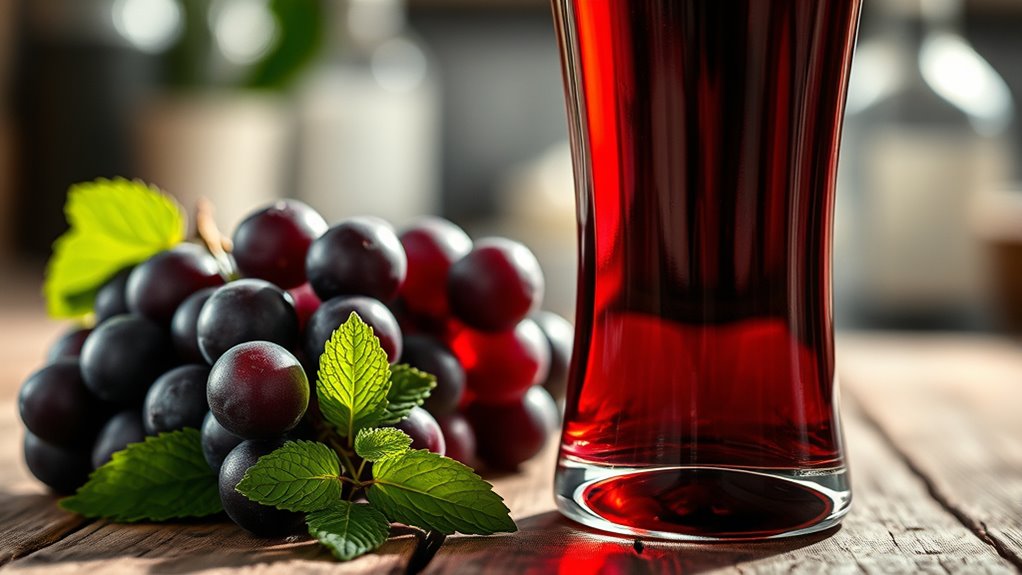
Numerous studies have demonstrated that resveratrol offers measurable anti-aging benefits, supported by both laboratory experiments and clinical trials. In lab settings, resveratrol activates pathways associated with longevity, such as SIRT1, and reduces markers of cellular damage. Animal studies show improved lifespan, metabolic health, and resistance to age-related diseases. Human trials, though limited, suggest resveratrol can enhance cardiovascular health, improve insulin sensitivity, and reduce inflammation. These findings indicate that resveratrol influences key biological processes linked to aging. While more research is needed to confirm long-term effects, current evidence highlights its potential as a natural supplement that may support healthy aging. The cumulative data provides a promising foundation for considering resveratrol’s role in anti-aging strategies.
Limitations and Conflicting Findings in Resveratrol Research
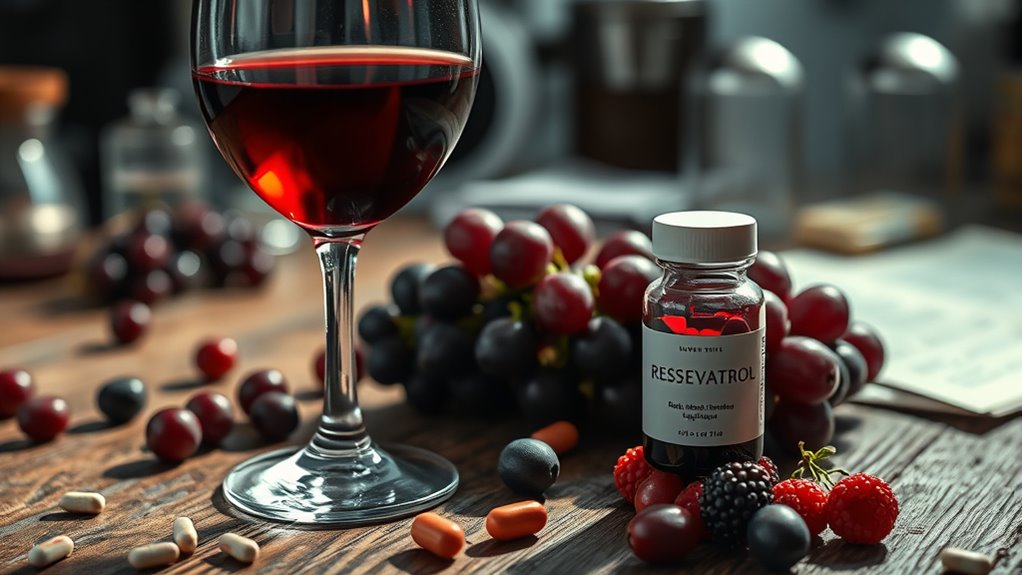
You should know that research results on resveratrol are inconsistent, making it hard to draw firm conclusions. Bioavailability remains a major hurdle, so even if you take supplements, your body might not absorb enough. Plus, questions about the right dosage and safety still need clear answers.
Inconsistent Study Results
Despite promising early findings, research on resveratrol’s anti-aging effects often yields inconsistent results. Some studies show benefits like improved metabolism or reduced inflammation, while others find little to no effect. This variability stems from several factors:
- Differences in dosages used across studies, affecting outcomes.
- Variations in study design, such as sample size and duration.
- Diverse populations with differing health statuses and genetics.
- Inconsistent methods of measuring anti-aging markers, making comparisons difficult.
These inconsistencies make it hard to draw definitive conclusions about resveratrol’s true potential. While some research hints at benefits, conflicting findings remind you to approach claims with caution, recognizing that the science remains far from conclusive.
Bioavailability Challenges Persist
One of the main hurdles in resveratrol research is its poor bioavailability, which limits how effectively the compound can exert its potential benefits in your body. When you consume resveratrol, much of it is quickly metabolized and eliminated before it can reach target tissues. This means that even high doses may not result in significant active levels circulating in your bloodstream. Researchers have struggled to develop formulations that improve absorption, leading to inconsistent results across studies. Some studies show promising effects, while others find minimal benefits, partly due to these absorption issues. This variability makes it difficult to determine whether resveratrol can reliably deliver anti-aging effects in humans. Consequently, bioavailability remains a critical challenge in translating laboratory findings into effective supplements or treatments.
Dosage and Safety Uncertain
Determining the most suitable dosage of resveratrol remains challenging because research findings often conflict, and safety concerns add to the uncertainty. You might wonder how much is enough or safe. Currently, there’s no universal consensus, which makes it hard to decide on a dose. Here are some key issues:
- Variability in study doses ranges from as low as 5 mg to over 5 grams daily.
- Some studies report benefits at low doses, while others find higher doses necessary.
- Higher doses may increase the risk of side effects like gastrointestinal discomfort or liver issues.
- Limited long-term safety data leaves you uncertain about potential risks from sustained use.
This conflicting evidence highlights the need for more research before confidently recommending specific dosages or confirming safety.
Practical Considerations for Supplementing With Resveratrol
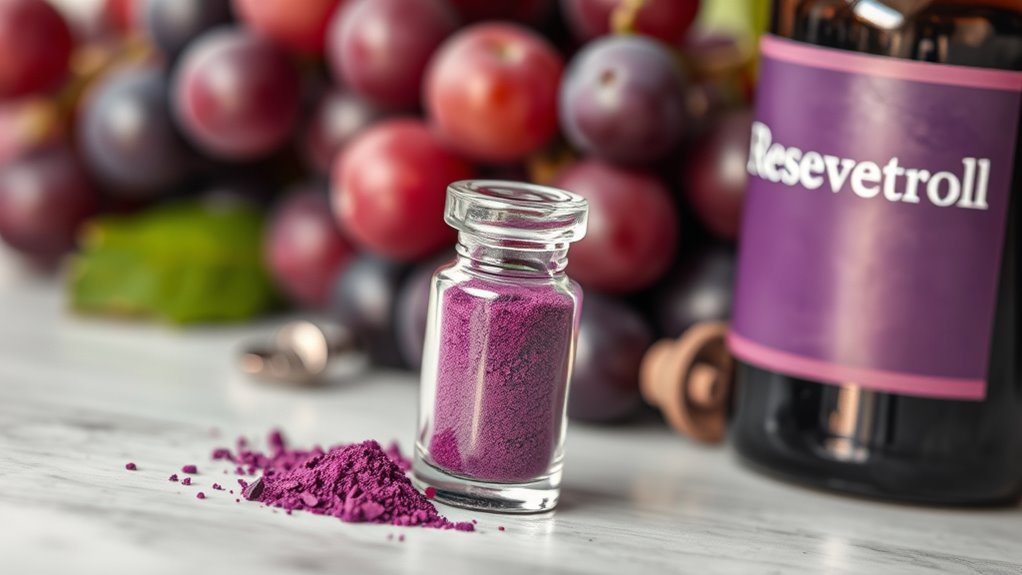
When considering resveratrol supplementation, it’s important to understand the factors that influence its effectiveness and safety. First, choose reputable brands with transparent ingredient sourcing and third-party testing. Resveratrol’s bioavailability can vary, so look for formulations designed to enhance absorption, such as those combined with piperine or in liposomal form. Start with a low dose to assess your response, and consult a healthcare professional before adding it to your routine, especially if you’re on medications or have health conditions. Keep in mind that supplements aren’t regulated as strictly as medications, so quality can differ. Take resveratrol with food to potentially improve absorption and reduce stomach upset. Monitor your body’s response and avoid excessive doses to minimize risks and maximize potential benefits.
The Future of Resveratrol and Anti-Aging Strategies

Emerging research is opening new possibilities for resveratrol’s role in anti-aging strategies. You’ll see advances that could make it easier to integrate resveratrol into your daily routine effectively. Staying informed will help you adopt innovative approaches as science progresses.
Emerging Research Advances
Recent advances in research suggest that the future of resveratrol as an anti-aging strategy is promising, as scientists explore new ways to enhance its effectiveness and delivery. Researchers are developing novel formulations to improve absorption and stability, ensuring your body benefits more efficiently. They’re also investigating targeted delivery systems, like nanoparticles, that direct resveratrol precisely where it’s needed. Additionally, studies are combining resveratrol with other compounds to boost its anti-aging effects synergistically. Finally, ongoing research aims to understand ideal dosing and timing, helping you maximize benefits while minimizing risks. These innovations could revolutionize how you incorporate resveratrol into your health routine, making it a more potent tool against aging. The future holds exciting potential for personalized, science-backed anti-aging strategies.
Integrating Into Regimens
As research continues to uncover innovative ways to enhance resveratrol’s effectiveness, the focus shifts toward seamlessly integrating it into your daily health routine. To do this, consider incorporating high-quality supplements with proven bioavailability, such as formulations with enhanced absorption. Pair resveratrol with healthy habits like a balanced diet, regular exercise, and adequate sleep to maximize its benefits. You might also explore combining it with other antioxidants for synergistic effects. Consistency is key, so establish a daily routine that makes taking resveratrol convenient. Consult with a healthcare professional to determine the appropriate dosage and guarantee it fits your overall health plan. By thoughtfully integrating resveratrol into your lifestyle, you can harness its potential as part of a complete anti-aging strategy.
Frequently Asked Questions
Are There Any Known Side Effects of Resveratrol Supplements?
Yes, resveratrol supplements can cause side effects. You might experience headaches, stomach upset, or dizziness, especially if you take high doses. It can also interact with blood thinners and other medications, increasing bleeding risk. If you’re pregnant, breastfeeding, or have hormone-sensitive conditions, consult your doctor before use. Start with a low dose to see how your body reacts and avoid exceeding recommended amounts.
How Does Resveratrol Compare to Other Anti-Aging Compounds?
You’ll find resveratrol offers unique benefits compared to other anti-aging compounds, mainly due to its antioxidant properties that support cell health and longevity. While compounds like NAD+ boosters or collagen focus on specific aging aspects, resveratrol targets inflammation and gene expression, potentially providing broader anti-aging effects. However, the effectiveness varies, and combining it with other supplements might enhance results. Always consult a healthcare professional before starting new anti-aging regimens.
Can Resveratrol Be Effective Through Dietary Sources Alone?
You can get resveratrol through foods like red wine, grapes, and berries, but don’t rely solely on diet to access its full anti-aging power. Like trying to fill a bucket with a tiny hole, the amount you consume from food might not be enough to see significant benefits. To really harness its potential, consider supplements or higher-dose options, but consult a healthcare professional first.
What Are the Optimal Dosages for Anti-Aging Benefits?
You should aim for about 250 to 500 milligrams of resveratrol daily to potentially see anti-aging benefits. Since dietary sources alone often fall short of this amount, consider supplements if you’re seeking significant effects. Always start with lower doses and consult a healthcare professional, especially if you have underlying health conditions or take medications. Consistency and proper dosage are key to maximizing resveratrol’s potential anti-aging properties.
Is Resveratrol Safe for Long-Term Use?
A stitch in time saves nine, and safety first is essential. Resveratrol is generally safe for long-term use when taken at recommended doses, but high doses may cause side effects like digestive issues or interactions with medications. You should consult your healthcare provider before starting or continuing resveratrol long-term, especially if you have existing health conditions or take other drugs. Moderation and medical guidance help guarantee safe, beneficial use.
Conclusion
As you explore resveratrol’s potential, think of it as a tiny but mighty guardian on your aging journey, like a secret weapon hiding in a glass of wine. While science teases its promises, remember it’s just one piece of the puzzle. Embrace a balanced lifestyle, and let this natural compound be a hopeful spark, shining light on your path to vigor. In the dance of aging, resveratrol might just be your graceful partner.




